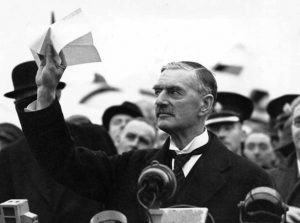1935-1939
Spring 1938 (Age 63)

Winston Churchill, Parliament Square, London © Sue Lowry & Magellan PR
March 12, 2015
In March Churchill was informed by the Evening Standard that his contract to write a series of articles for them on foreign affairs was being terminated because his views were not in agreement with those of the newspaper’s proprietor, Lord Beaverbrock. He quickly reached agreement with the Daily Telegraph, although its owner, Lord Camrose, insisted on a six-month trial because “our policies might well be at serious variance.” These articles were interspersed with others in the News of the World. Millions of readers were reading his views every week as they were syndicated throughout Europe and the Empire.
He reached fewer, but more influential, audiences in his public speeches. He believed that a national defence campaign was necessary and was doing his utmost to contribute his share to it. His goal was to unite England on the issue. “Our party must carry the Trade Unions with them. Non-Conformists, Churchmen and Catholics must work for the common end.” His son Randolph published a collection of his speeches on defense under the title Arms and the Covenant in England and While England Slept in the United States (Woods A44).
Distressed by proGerman and anti-French propaganda in Britain, he flew to France to advocate an Anglo-French alliance. When he was received with full honours by the French, the Cabinet let it be known that he spoke only for himself and not the Government. He believed that “if France broke then everything would break, and the Nazi domination of Europe, and potentially of a large part of the world, would seem to be inevitable.” In April, Leon Blum’s Government fell and Edouard Daladier became Premier. “A capable and sincere man,” said Churchill.
When an agreement was signed by Britain and Italy which recognized Italian control over Ethiopia, Churchill called it “a complete triumph for Mussolini.” The Government also negotiated an agreement with Ireland to end British naval rights at several Irish ports. Churchill saw this as another example of appeasement. He equated it to a withdrawal from Gibraltar or Malta but his criticisms further alienated him from the Conservative Party.
In May he met with Conrad Henlein, the leader of the Sudeten Germans, who Churchill called “the best treated minority in Europe.” He approved of a Henlein plan for a federal system in Czechoslovakia but informed Henlein that “if Germany attacked Czechoslovakia, France and then England would come to the latter’s assistance.”
When Lord Swinton resigned as Secretary of State for Air it was assumed by many that Churchill would join the Cabinet. But Chamberlain was still not inclined to offer a position to his principal critic. For his part, Churchill professed to be reluctant to come aboard. “The present majority will remain dumb to the end,” he said.
Subscribe
WANT MORE?
Get the Churchill Bulletin delivered to your inbox once a month.




